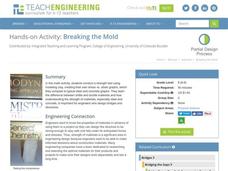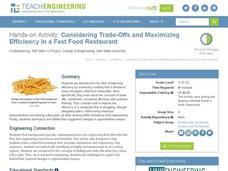NASA
Creating a Space Exploration Infrastructure
What will it take to explore space? Teams of pupils determine the needs of a lunar outpost and research the required systems. The pupils then learn about the past space exploration vehicles. The third and final lesson challenges project...
NASA
Space Transportation: Reshooting the Moon
What does it take to get stuff to the Moon? Design teams create subsystems for a space transportation system to go to the Moon. The teams study Earth transportation components along with historical space transportation systems to guide...
Teach Engineering
Measuring Viscosity
Groups use a marble to determine the viscosity of household fluids. The procedure calls for pupils to measure the amount of time it takes a marble to fall a specified distance in the fluids. Using unit conversions and algebra, the teams...
Teach Engineering
Microfluidic Devices and Flow Rate
When you have to flow, you have to flow. The lesson introduces class members to microfluidic devices and their uses in medicine. They watch a short video on how the diameter affects the rate of flow. The worksheet has individuals...
Teach Engineering
Quantum Dots and the Harkess Method
The Fantastic Voyage is becoming close to reality. The class reads an article on the use of nanotechnology in the medical field and participate in a discussion about what they read. The discussion method helps class members become more...
Teach Engineering
Maximum Power Point
Investigate the maximum power output of a photovoltaic panel with a lesson that introduces the class to the maximum power point. Individuals learn how to determine the maximum power point of a solar panel by using Ohm's law and the power...
Teach Engineering
The Magician's Catapult
Class members work in pairs to build a catapult to launch a grape a given distance. The catapult project, a compound machine, reinforces pupils' understanding of simple machines.
Teach Engineering
Let's Learn About Spatial Viz!
Can you see your class working on spatial visualization? The first installment of a five-part module introduces the concept of spatial visualization and provides a 12-question diagnostic assessment to test spatial visualization skills....
Teach Engineering
The Building Blocks of Matter
Everything can be reduced to atoms. The first installment of a six-part Mixtures and Solutions unit focuses on the building blocks of matter. Scholars review basic atomic structure, including protons, neutrons, and electrons, in...
Teach Engineering
Strong-Arm Tactics
Experience collecting rock samples using a robotic arm with an activity that has pairs work together to operate a robotic arm. One pupil serves as the eyes and the other operates the controller. The objective is to be the fastest pair to...
Teach Engineering
Light Up Your Life
How do lighting types affect energy efficiency? Explore different types of lighting and the energy they use. Pupils learn about types of lights and calculate the energy used during a typical school year. They discover that being energy...
Teach Engineering
Dress for Success
Dressing for success is not always about looking sharp. Sometimes it is about staying warm and dry. Present your class with an activity that challenges groups of pupils to design a layered material for blizzard conditions. The teams test...
Teach Engineering
Edible Rovers (High School)
Design and build a rover ... then eat it? This activity has groups of two design and build Mars rovers. The teams determine what instruments they want to include with their rover and plan a budget. They calculate the cost of the body of...
Teach Engineering
Machines and Tools (Part 2)
Which pulley system will give us a whale of a good time? Teams compare the theoretical and actual mechanical advantages of different pulley systems. They then form a recommendation for how to move a whale from an aquarium back to the ocean.
Teach Engineering
An Introduction to Air Quality Research
Viewers are a PowerPoint are exposed to the idea that pollutants are in more than just the air we breathe. the presentation provides information about the layers of the earth's atmosphere and takes a look at the pollutants in the...
Teach Engineering
Model Heart Valves
Small groups use the knowledge learned about the heart to design and build a prototype of an artificial heart valve. The teams demonstrate the functionality of their valve. They are also responsible for creating a pamphlet that describes...
Teach Engineering
Breaking the Mold
A little too much strain could cause a lot of stress. Groups conduct a strength test on clay. Using books as weights, pupils measure the compression of clay columns and calculate the associated strain and stress. Teams record their data...
Teach Engineering
The Challenge Question
A research position becomes a modeling job. The introductory activity in a series of nine presents the challenge of analyzing a set of bivariate data. The class brainstorms what the data may represent. Pupils must decide what is needed...
Teach Engineering
Amusement Park Ride: The Ups and Downs in Design
Groups design the ultimate roller coaster by considering potential and kinetic energy. They test their designs using marbles and then go on to rate each group's design based on aesthetics, loop diameter, and cost.
Teach Engineering
Considering Trade-Offs and Maximizing Efficiency in a Fast Food Restaurant
Make fast food restaurants even faster. Groups consider trade-offs when maximizing efficiency in fast food restaurants. Restructuring schedules and floor plans, as well reassigning job duties, all fall under this directive.
Teach Engineering
Messin' with Mixtures
Do you separate your trail mix before eating it? Then you've been separating mixtures your whole life! Scholars model a contaminated soil sample using trail mix and estimate the percentage of each component. They consider how to clean up...
Teach Engineering
Take Off with Paper Airplanes
Let's go fly a kite ... oops, a paper airplane! The 13th segment in an aviation unit of 22 relates the parts of an airplane to paper airplanes. Pupils learn the functions of the control surfaces of a plane to really make their knowledge...
Teach Engineering
Air Pressure
Investigate what is pushing on us. An intriguing activity has pupils calculate the amount of force on various squares due to air pressure. Using the data, individuals create a graph in the third activity of the Up, Up and Away unit...
Teach Engineering
Properties of Mixtures vs. Solutions: Mix It Up!
Now it becomes crystal clear why the unit is called Mixtures and Solutions. The fifth installment of a six-part unit explores mixtures and solutions. After viewing a demonstration on mixing pebbles with water, salt with water, and...

























